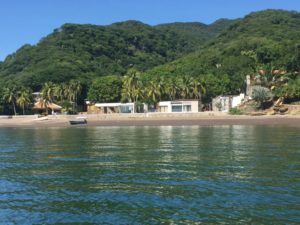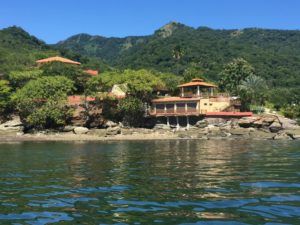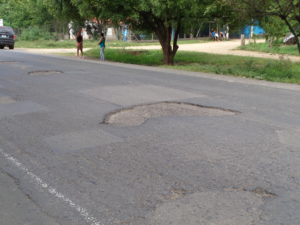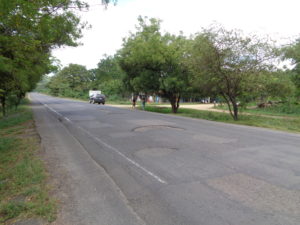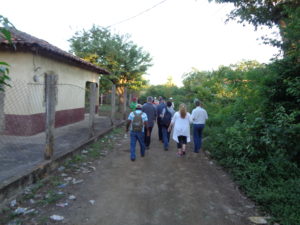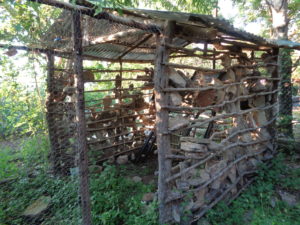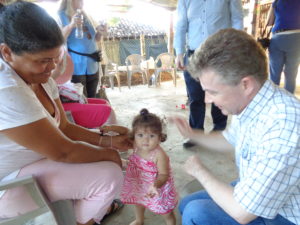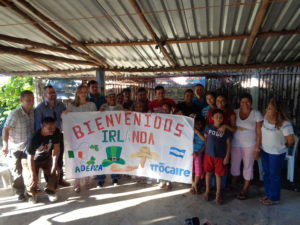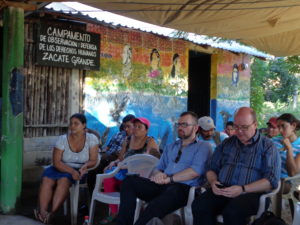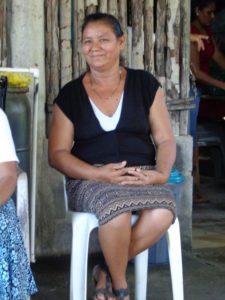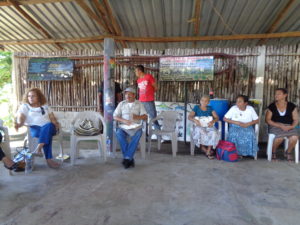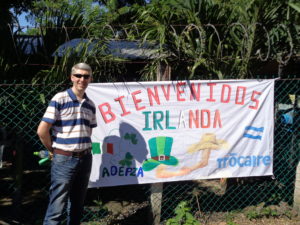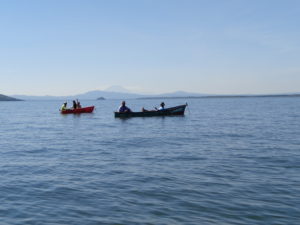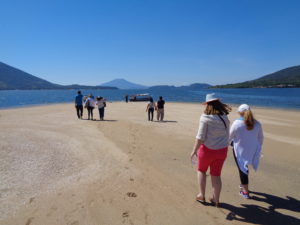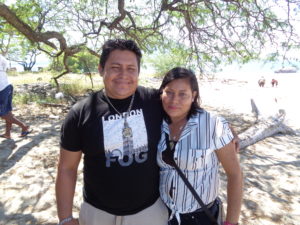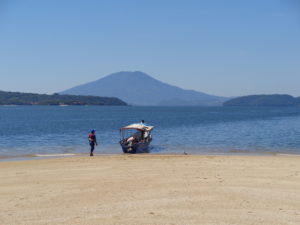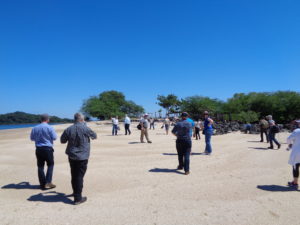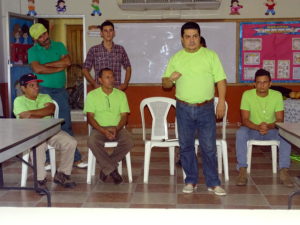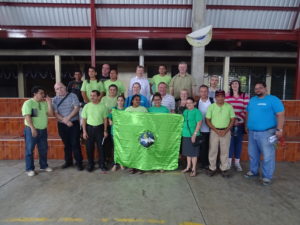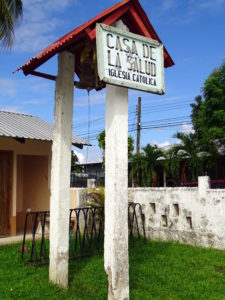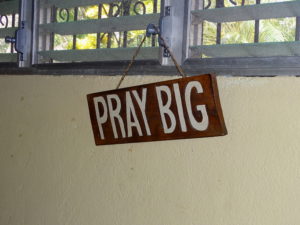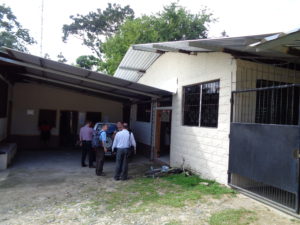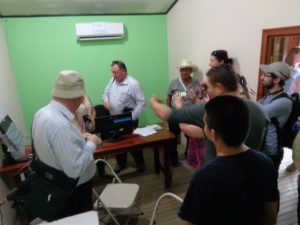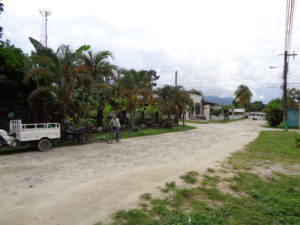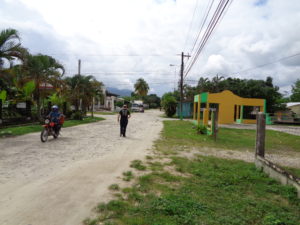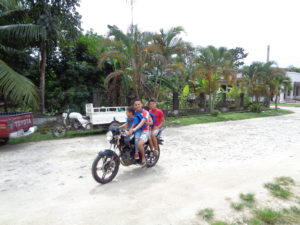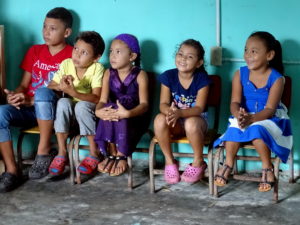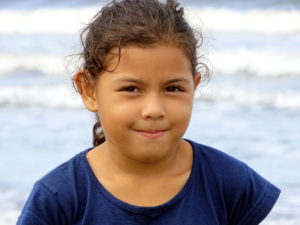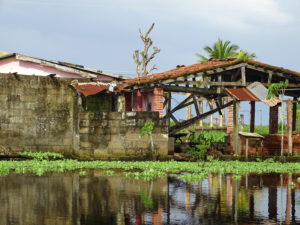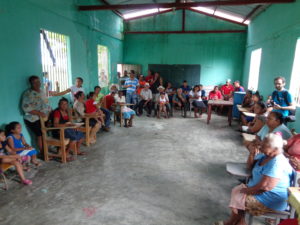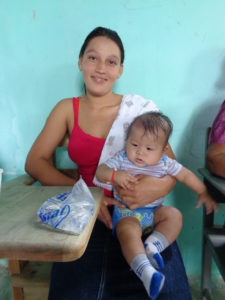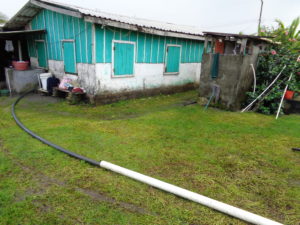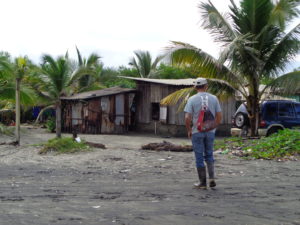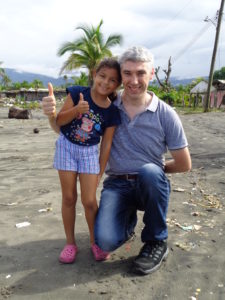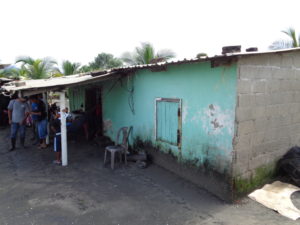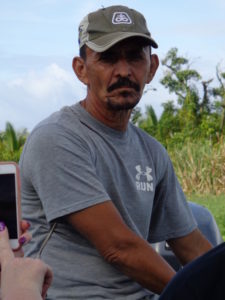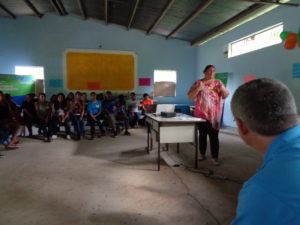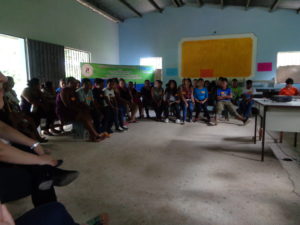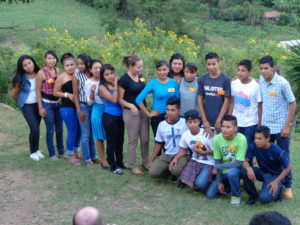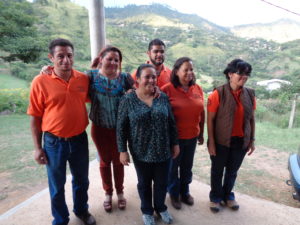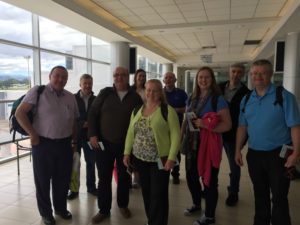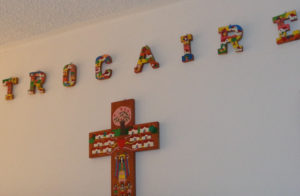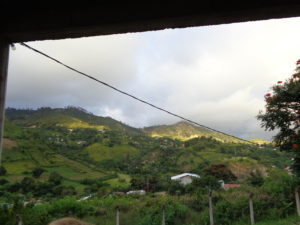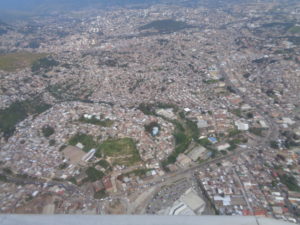Elphin Deacon reflects on visit to Honduras with Trócaire
Fifth Sunday Of Lent, 2nd April 2017
Honduras: A home without people
A journey from Tegucigalpa to the south continued to reveal just how difficult life is for the general population. Cement houses/galvanised iron houses dotted throughout the landscape or huddled together in miniature communities and no matter where I looked I felt a sense of great poverty and despair. The final destination after an arduous four-hour journey revealed the North Pacific Ocean and more specifically the Gulf of Fonseca and the Zacate Grande Peninsula.
The scenic view and the weather was certainly in great contrast to the visit north, with a much dryer climate and the searing heat of a sharp sun. The area was still extremely green and lush with white sandy beaches. In essence we could have been on a five-star tropical island. Meeting some local community members, we were brought on a small motorised fishing boat to an island just off the coast. This gave us the opportunity to look back inland and just see how beautiful this place really is. However, we were soon enlightened as to a very dark side.
To put it all into perspective the group that met us and were showing us around are a part of the Zacate Grande Peninsula Development Association. As we stood on the island we could see dotted all along the coast extremely large and luxurious houses sitting in prime locations close to the sea front. It was explained to us that each of these houses were owned by very rich and powerful people who had acquired the plot of land on which the house was built through very questionable means. Although the initial ‘paperwork’ for the property may state otherwise the lands were originally, for generations, lived on by local people, and although the paperwork did assign a specific portion of land to these ruthless rich they physically took much more and in so doing demanded ‘rent’ from those living and farming the land – failure to pay this unjust rent would ultimately result in eviction and imprisonment. We were told of the little island on which we stood, had one dwelling, in which a man used to gather the sea shells from around, crush them and sell them to the people with hens on the mainland – this was all he had to live on. One rich person had been ‘granted’ through very unjust means the rights to this tiny, sand-dune island. The man had no means to make payment on the rent and refused to leave as he and generations before him had lived on this island. The local people are unsure as to what happened to him but overnight he ‘disappeared’. Unfortunately, in Honduras, there are no records of land ownership and so those with power can buy their way to ownership by whatever means possible.
From this island we travelled for about an hour northward and as we looked upon the main land dotted all along the coast line we saw more and more of these mansions popping up, costing millions of dollars to build, some even with helicopter pads. Arriving at our destination we were greeted with such a beautiful welcome and a meal of locally caught fish, rice and salad. It was humbling to feel this group of people had gone to so much trouble for our visit. During our conversation we heard of the harassment and intimidation that the people and those representing them in the judicial system experienced. The sentences, imprisonment and physical aggression that could be linked back to the rich and wealthy who had taken the people’s land. In some instances, those representing the community at judicial level were threatened to such an extent that they feared for their own lives and the lives of their family. Those who continue to fight their cases do so at extreme risk. We heard from one woman who told us that she was out tending to her corn crop one day when some men arrived taking photos of her land. Asking them what they were doing and why, they told her they were taking it and that she would be expected to leave. Upon their return she was told, by armed men, that she could remain on her land until she harvested her crops (some four or five week from when she spoke to us) and then if she did not leave she would be ‘removed’. This woman was probably in her early 60s. This is just one of many intimidation and harassment stories we heard that day and it left me feeling a great sympathy for these people who, by very peaceful means, were trying to legally acquire their own land, and were met with ‘brick wall’ after ‘brick wall’. I could draw great parallels between the scenarios these people were faced here in 2016 and what Ireland faced in the 1800s. Corrupt legal systems, land rights, economic greed and blatant aggression.
Prior to our departure we sang the song ‘Fields of Antenry’ for them and in return they sang a similar song, that they had composed themselves. Because of the nature and wording of the song and to protect the individual’s identity I have decided not to share this footage – that is the fear and risks these people face daily!
As I reflect on the Gospel, of this the fifth Sunday of lent I feel a great sense of sadness: Mary and Martha distraught over the death of their brother Lazarus, all those gathered sympathising and quite clearly the sighs that Jesus makes. As I listened to what is happening to this community, the indifference that the rich and powerful have for those in much poorer circumstance I cannot but feel upset and saddened at what they are experiencing. Every which way these people turn they are faced with obstacles. Corrupt legal systems, malicious intimidation and aggression. It almost seems hopeless and I am sure Mary and Martha had a similar feeling as they wept for the loss of their brother, Lazarus, however Jesus brings with him hope to all gathered around Lazarus’ tomb. He shows great compassion and love. Today we are called to do the same. To give the community of Zacate Grande Peninsual the opportunities to roll away that heavy stone of corruption and aggression, to unbind them from the oppression inflicted upon them and to bring them from the dark tomb to a world full of light. Through our support of Trocaire we have the potential to begin to do that and in so doing we to are growing further in love and community with these people and with God.
Fourth Sunday of Lent, 26th March 2017
Honduras: Rich in natural resources, poor in compassion
Journeying through Honduras is an eye opener in itself. As one travels along the first issue that is encountered is the poor quality of the roads. Cars, busses, trucks all have to swerve to avoid not so much pot-holes but craters in the roads – this poses a significant risk as on many occasions as we travelled along to avoid the holes we were looking straight at another car or large artic lorry coming in the opposite direction. Dotted along are houses of very simple structure – cement with a galvanised roof in many cases. A front door and window seemed to be the exception rather than the normal. Litter was quite evident in places of higher population as well as the exploitation of natural resources.
One such group we met who are battling to try and maintain natural resources explained that a river that was once the source of food and irrigation for the areas it passed through has now been reduced to little more than a trickling stream. This is as a result of addition of hydroelectric dams that do not abide to environmental laws and so hold the water up stream starving the communities further down of all necessary resources. These dams also pose a serious risk of flooding as building standards and regulations are not monitored. Witnessing it first-hand it was frightening to see the level the river had been and where it is now, even during the wet season. This particular group had organised to meet us in a school classroom, giving us a chance to see some of the facilities. No matter where you travel to, some things remain crucial to a community’s success and one such thing is education. Our visit was during the afternoon with plenty of day light however the group we met explained that they had no light and no air conditioning that day as the electric company had cut the power for a number of hours. Because of the community’s stance in trying to secure their water and resource rights they can oftentimes find themselves intimidated by the stronger and more powerful. In light of all these adversaries the cheerfulness and hope we found from all groups visited was inspiring. Included at the bottom of this article is a fantastic demonstration of the talents and abilities by a group of children from the school we visited.
Another group in a different location were experiencing similar issues with mining companies. Open cast mining is a regular occurrence in Honduras and at any cost to the environment and local communities – pollutants enter the water system and devastation to the picturesque landscape are just some of the immediate impacts. People and families who may have lived on their lands for generations are now threatened and intimidated to leave so that mining can take place. Local authorities and law enforcement do not appear to be interested or willing to become involved and their neutrality on situations can oftentimes be questionable. In some instances, we heard from individuals who had to leave their homes under the cover of darkness to avoid death through intimidation and had to remain away from their homes/communities for many years for fear of what may happen should they return. The sad reality is that the rich in Honduras grow richer whilst the poor get poorer. Statistics suggest that the richest 20% of Hondurans receive two-thirds of the national income.
It is very disturbing and upsetting to sit and listen to the struggles of the local people as they fight by peaceful means and by utilising the legal system, against a country that is extremely challenged politically and environmentally. Corruption appears to be rife at the highest levels and with it brings hardships to those who are struggling to survive.
We are now over half way through our Lenten journey and I can’t help but consider the blind man in this week’s Gospel story and my own journey to and through Honduras. The entire experience was massively outside my comfort zone. Travelling to a country that I had almost no idea where it was positioned in the world just a few weeks earlier to being there and among people who struggle every day for basic human rights and entitlements was an eye opener for me. We can oftentimes just live in our own bubble and think that nothing matters outside of that but it does – our world is not just the here and now – the ‘our bubble’ is every corner of earth. Every human being from the youngest to the oldest deserves a life that has hope, fairness, equality and justice. The people of Honduras continue to seek and for us we need to open our eyes to realise that it is through our help and support they will eventually find a way of life that they truly deserve.
‘He put a paste on my eyes, and I washed, and I can see’ (John 9:6)
Third Sunday of Lent, March 19th 2017
Honduras: A land of people thirsting in a flood
We are all affected by climate change in some form – in recent years, here in Ireland, we have seen unprecedented amounts of rain fall, more Atlantic storms and rising sea levels resulting in coastal erosion. For the most part we seem to escape the worst of climate change and its effects however because of the location of Honduras it is certainly not so lucky and is much more severely affected.
A short plane journey from Tegucigalpa to San Pedro Sula (northern Honduras) revealed a countryside quite similar in appearance to some parts of Ireland. Green hilly countryside with rivers cutting through the landscape. However, looking down at the world from 15,000ft makes for a very pretty picture compared to being on the ground. After landing San Pedro Sula we travelled in a convoy of three 4×4 jeeps to a small community living in an area called Omoa Cortes. This area is very isolated and to get there we had to travel along the sea shore and through dirt tracks to reach the community. Looking out onto the Caribbean Sea you would consider the location to be very picturesque and idyllic. This impression was short lived as soon the truths were revealed and it demonstrated in a very clear way the effect that each person, through their carbon footprint, including anyone reading this article, can contribute to the hardships of others. Meeting the people, they spoke of the rains and floods that now batter their small community and the rising sea level on the other side it has now become a very hazardous place to live. Increased rain storms and the rising sea levels, all as a consequence of climate change, can leave their village marooned – trapped between sea and now marshland turned river and as the water rises their dwellings, very simple in structure and design, are flooded. Faced with only one option to evacuate, as to stay would certainly mean death, the people that own boats bring the people upstream to escape the rising waters. Upon return the community is faced not only with the devastation to their homes and surrounds. Their land also becomes unusable as it has been poisoned by the sea water and there is also the added complication of waste that has been washed in or carried downstream by nearby rivers. I witnessed one child, aged 6, called Maria playing beside a pile of rubbish in which I could clearly identify hospital waste and syringes!
Maria lives with her mother Miriam Marivel Campos Perez, aged 30. They are featured on this year’s Trocaire Lenten box and as we spoke with Miriam she told us that because of the continuous rising of sea levels (due to climate change) she felt that she may have only a few months left in her home. Her struggle each day is to provide for her daughter Maria and after each flood to try and restore her house to being habitable. Dampness, mould and mildew were clearly visible on the walls, and it had been some time since the last evacuation. Sadly, we learned that about two months after our visit the house close to Miriam and Maria was destroyed in another of the now all too common rain storms. It is only a matter of time now before Miriam and Maria also lose their home.
Trocaire is working with this community in collaboration with the local Municipal (Council) by supporting emergency response teams, creating safe routes for people to escape and providing vital supplies and shelter. Through the support and donations of people during their Lenten and other campaigns, the opportunity is created to help empower communities to be proactive and organised, to educate and give hope to Miriam and her community in their struggle.
As I reflect on the Gospel for the third week of Lent, the first word that springs to mind is thirst. At the well Jesus’ discussion with the woman leads her on a journey into a deeper more human way of life. Her spiritual thirst is quenched by her encounter with Jesus. Miriam, Maria and so many like them in Honduras, and indeed across the world, are also thirsting for safety, security, a better way of life. The destruction that is brought about by climate change is as a result of how each of us use and perhaps abuse our environment. Our carbon footprint in not having a local effect it is having a global effect. This lent, like the woman at the well, let us be open to allowing Jesus into our lives, to open our eyes to what we could do to reduce our carbon footprint and to see in what small way we can help Miriam, her daughter and their community, to satisfy their thirsts.
‘anyone who drink the water that I shall give will never be thirsty again: the water that I shall give will turn into a spring inside him, welling up to eternal life.’ (John 4:14)
Second Sunday of Lent, March 12th 2017
Honduras: A country of violence, transformation and love
My role within the Trocaire organisation is as Diocesan Representative for the Diocese of Elphin. Each year a number of diocese are chosen to select an individual(s) to travel with a group to a country that will be the focus of the Trocaire Lenten Campaign. Along with 9 others we undertook at weeklong journey to Honduras with flights taking us from Dublin – New York – Heuston – Honduras. On the face of it this may sound like a great ‘getaway’ however, without a shadow of a doubt it proved to be the toughest week both physically and psychologically I have experienced.
Upon arrival we were greeted by those working with Trocaire who are based in Honduras and introduced to the local currency – the Lempira. In exchanging 50euros for 1,250 Lempira I almost felt rich holding all these notes and indeed in comparison to many people living in Honduras I was, considering that the average daily income for over 5millon (62%) of the population is just €2 per day. Imagine your total earnings for a day being the price of a cup of coffee! That 50euros was the equivalent of working five days a week for one month!
On the afternoon of our arrival we were brought to the Trocaire head office, which is located in what I would describe as a compound – behind a high 10ft walls. A common sight was to see armed security positioned outside many business and office premises, as a protection and deterrent against robbery and attack. This set the tone as to the risks and dangers that we faced each time we moved around Tegucigalpa and indeed throughout Honduras. Security and safety were always upmost in our minds and our reliance on the staff of Trocaire could be compared to a child and its mother. Following the security briefing at the head office we were taken to see our first project supported by Trocaire – ‘Alternativas y Oportunidades’ (AYO). This project began in 1990 and contributes to try and reduce the social risks faced by children and youth working in the markets and streets of Tegucigalpa and Comayaguela (another population centre just outside of Tegucigalpa). It is achieved through alternative health services, education programmes and activities. The project supports not just the youth but also the entire family as so many women suffer domestic violence at some point in their lives. The group we met were all quite young and many of them stood up and spoke, in Spanish, but very clearly and confidently about how beneficial the benefits that this project, supported by Trocaire, has been in transforming their lives and their outlook. Young men and teenagers had been thought how to respect their female counterparts and to understand what it means to be a man rather than carrying the macho culture – they described this education or new view as ‘masculinity’. Women and young girls learned how to be proactive and gained confidence within themselves and so this permeated to the wider community. It was beautiful to see that from just this one project the change and transformation that was taking place within this community and its youth. What we often take for granted, and is accepted as the ‘normal’ is so new and fresh in Honduras.
As I reflect on last Sunday’s gospel – that beautiful description of the Transfiguration, on mount Tabor, I can’t but see some parallels between it and this first group of people. It was wonderful to have visited this group and to see first-hand the brilliant effect that this project, through the support of Trocaire, can have on people’s lives. The welcome we received, the desire for happiness and stability that the people longed for. The transformation and change of attitudes that was brought about. On this the first day of our visit I could clearly see just how important the support of people like you, who read this, is to Trocaire, as it is not Trocaire, the organisation, that we are supporting it is the young men and women, the single mothers, the men open to attitude change and the community they all live in – that is a transfiguration that can only be brought about through our support and care for our fellow man.
‘There in their presence he was transfigured: his face shone like the sun and his clothes became as white as the light’ (Matt 17:2)
First Sunday of Lent, March 5th 2017
Honduras: Temptations
We have a prayer that we often recite to our Guardian Angel, asking for care and protection as we begin our new day, enter into the darkness of evening or before we close our eyes at night. The Gospel reading for this first Sunday of Lent speaks of the temptations that were presented before Jesus as he spent those 40 days in the desert. Each temptation would have removed all the hardships and pain that Jesus faced upon his returned to Jerusalem. But he chose to the more difficult path – he fought the temptations and won and the final sentence in our Gospel passage tells us that ‘angels appeared and looked after him.’ (Matt 4:11)
Sadly, today’s world is so full of temptation, could it almost be said that it is almost a fact of life? Is our world controlled by the temptation of money, greed, corruption, power? Is the list in our modern society almost endless? Oftentimes temptations can be very subtle and almost unnoticeable whilst on other occasions they are so obvious and result in unimaginable hardships and pain for others. I was a part of group of 10 people connected, in various ways, with the organisation Trocaire recently travelled to Honduras to experience and see first-hand the tragic effects that temptation and greed can have on an entire country and how people-power through the assistance of Trocaire, the Irish Church’s response to world injustices, i.e. your response, stand up for what is right, through peaceful, legal and diplomatic means.
Honduras is located in central America and is about one and a half times the size of Ireland with a population of approximately 8.5million. The country has recently featured on our television screens with Hector on TG4, travelling through Central America visiting Honduras’ capital Tegucigalpa (Tee-gues-e-caulpa). Also a programme aired just a number of weeks on RTE1 called ‘Toughest Place to Be: Honduras’. The program’s blurb describes Tegucigalpa as ‘one of the most violent places on earth’. It is in this setting that we find that temptation, that greed, that corruption at its greatest. However, within this setting we also find people, groups and communities of love and great faith, who are willing to risk their own lives to peacefully fight against this temptation and to say as Jesus said in our Gospel ‘Be off, Satan!’ (Matt 4:10)
Over the coming weeks of lent I will tell of my experiences as I visited Honduras. The people and groups I met. The hardships and pain they have to endure on a daily basis. The difficulties that face them and how through your donations to Trocaire, a difference can be made to the people’s lives. Currently available in all diocesan churches are the Lenten Trocaire Campaign packages. Within this package you will find a Lenten Trocaire box, an envelope should you wish to use it instead of the box, and some information pamphlets. As someone who has visited a country in which Trocaire works and has seen what they do first hand I know, and hopefully as you follow along over the coming weeks you will also know, the outstanding work that is done, all thanks to your very generous donations during this period of lent, or indeed at any other time. This lent each of us can, in our own small way, become a guardian angel to those less fortunate.
Deacon Damien Kearns, Diocese of Elphin
Lent 2017
(Each Sunday of Lent 2017, Deacon Damien will share his experience of his visit to Honduras with us).
To learn more about the work of Trócaire and their 2017 Lenten Campaign see www.trocaire.org
Deacon Damien Kearns (2nd from right) travelled to Honduras with a group representing Trócaire in November 2016.


